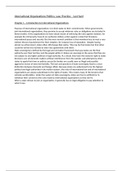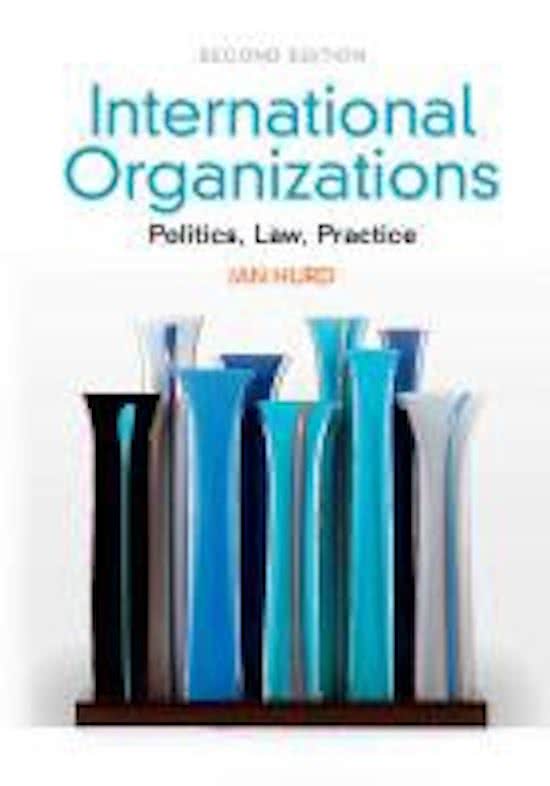International Organizations Politics, Law, Practice – Ian Hurd
Chapter 1 – Introduction to International Organizations
Purpose of international organizations is to bind states to their commitments. When governments
join international organizations, they promise to accept whatever rules or obligations are included in
these treaties. A few organizations do have robust means of enforcing the rules against violators: for
example the UN Security Council can authorize military action against a state that threatens
international peace and security. But the more normal condition is that members face at most a very
indirect threat of punishment for their violation, for instance loss of reputation. Despite having
almost no enforcement, states often still change their policy. This may be that states fear that other
countries will be less inclined to enter into agreements with them.
State sovereignty is defined by the legal and normative framework that says states are the final
authority over their territory and the people within it. States are sovereign in the sense that they are
not subject to any higher political or legal authority. As a result, they have the exclusive right to make
decisions over all domestic matters without interference from the outside, and attempts by other
states to apply their laws or policies across the border are usually seen as illegal and possibly
aggressive moves of extra-territoriality. The laws and practices of state sovereignty lead to a clear
distinction between domestic and foreign affairs. Because states are understood to be the highest
political and legal authorities in de modern system, the rules of international law and of international
organizations are always subordinate to the rights of states. This creates many of the tensions that
animate world politics. Under the system of state sovereignty, states are free to withhold or to
withdraw their consent to the rules made by international organizations as they see fit.
When a state refuses to join an organization, it generally has no legal obligation to pay attention to
what it says.
, Chapter 2 – Theory, methods, and international organizations
Realism
States are motivated by a sense of their own insecurity to continually look for ways to increase their
power. For realists, power is understood in terms of material, military resources such as tanks and
bombs, and in the contribution of these to the power of security of a country. The realist approach to
international politics involves an ontological claim (that states are the starting point), a theory of their
motivations (power-seeking due to insecurity) and a theory of what constitutes power (materiality).
Liberalism
Emphasis on the choices that actors make in the pursuit of their interests, in relation to the choices
and interests of other actors. Liberalism suggests that IOs can be seen as a series of agreements
which states enter into expecting to receive a gain.
Constructivism
“Ally” and “enemy” are two ways of seeing other countries (or other people) and these ideas
influence how we behave toward them in turn how they behave towards us. This example illustrates
the two key features of constructivism: actors behave toward the world around them in ways that are
shaped by the ideas that they hold about the world, and that these ideas are generated by past
interactions. Realism, for instance, would expect the US to behave toward North Korean nuclear
weapons in the same way as it did to British nuclear weapons since, after all, a British bomb would do
the same damage than a North Korean bomb. There is no material difference between the two.
Liberalism would encourage us to see what mutual advantage might be realized by coordinating
between the parties, but has little to say about why one relationship looks conflictual while the other
looks friendly.
Marxism
International politics and international economics are one singular system, and that this system is
inherently unequal. This involves the unequal distribution of power among actors in society, in which
rich states and firms share a privileged position against everyone else. The main global organizations
such as the UN, the WTO, and the IMF, contribute to maintaining the existing divisions between rich
and poor. The mechanisms by which this happens include the unequal voting rules and membership
of the UN Security Council, the WTO’s efforts to reduce tariffs on Third World exports such as textiles
but their inaction on reducing rich-country subsidies on agriculture, and the IMF’s capacity to force
countries to adopt market-based policies that harm the poor.
Concluding remarks on IR theory
All four approaches above are about political power and the pursuit of state interests – realism does
not monopolize the study of power, just as liberalism does not monopolize the study of self-
interested bargains. Marxists and constructivists are just as interested in power politics and national
interests as liberals and realists. What the four disagree on is how power should be conceived.
IOs as actors
At times, international organizations behave like independent actors in international relations, issuing
decisions, taking actions, and being talked about as if they were players in their own right. At other
times, they provide a forum in which states (or others) carry out their negotiations and their
diplomacy. Being recognized as an actor requires some kind of social recognition plus some kind of
capacity for action. For international organizations, this means they must be recognized by the
international community as actors, and that in that community their decisions must have some
impact.
IOs as fora





